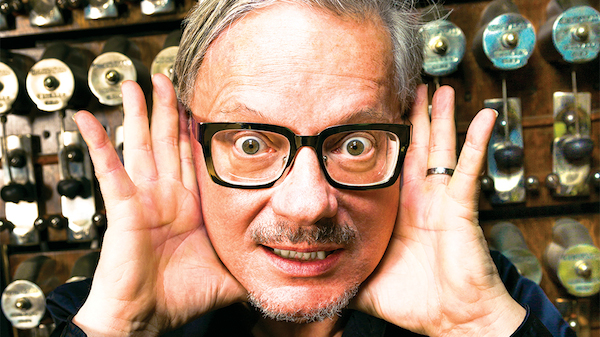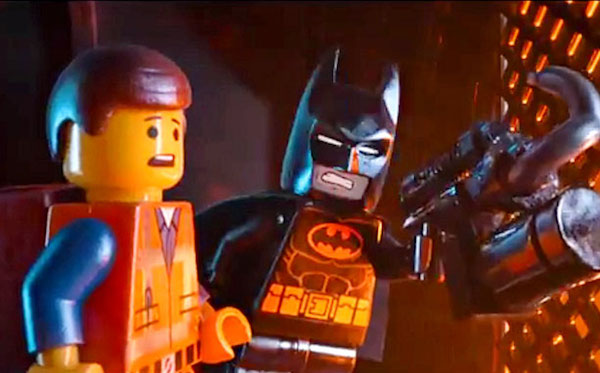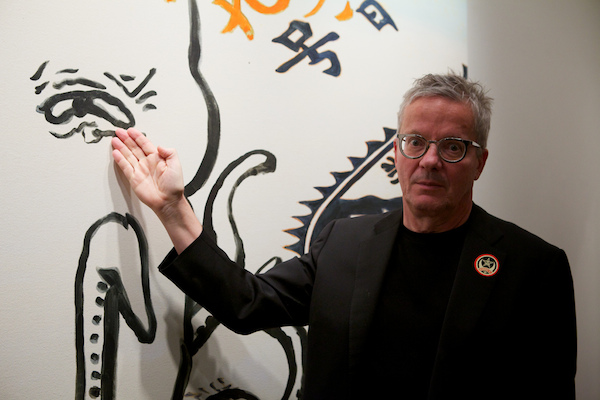There’s multiple aspects of each film that really immerse us into each world that’s displayed on the big screen. We could get caught up by the beautiful cinematography, the rich story line, and let us not forget the score. No matter what kind of cinephile you are, there’s always at least one or two movie scores that really stick out in your mind, making that film infinitely more memorable than the others. The same could be said about a television show or video game that you may play. Mark Mothersbaugh first came on the scene as a member of the popular band Devo, but ever since he took on the monstrous task of being a composer, he’s created a plethora of terrific scores up to this very day.
Mark Mothersbaugh recently did the score for Phil Lord and Chris Miller’s “The Lego Movie,” which recently became a hit at the box office. I recently spoke to the famous composer about his latest work in music and in art.
ShockYa: So how many movies have you done so far? Have you kept count?
Mark Mothersbaugh: I don’t know. I know if you added up all the TV shows and all the movies and all of the games, it’s somewhere around 135 or so. Some of them it was like 10 years of Rugrats, a lot of them ran for 3-4 years, a lot of the TV shows, so they overlap.
ShockYa: So when it came to The Lego Movie, was it just a matter of Phil Lord and Chris Miller calling you up and saying hey, do you want to do another movie with us?
Mark Mothersbaugh: First time we worked together was with “Cloudy With a Chance of Meatballs.” They were trying to think of who they wanted to work with as a composer and, lucky for me, they didn’t know anybody. How about the guy from Devo? So that’s how I got my job. But on Lego I got the return the favor. I got hired five years ago to work on “The Lego Movie.” They needed some help with the pitch for an older version of the movie that actually was a totally different script. It was a different script than what you see on the screen. While I was in there, I didn’t really end up writing music for them. I just gave them some of what they should do, but I said you know what? I just worked on a film called “Cloudy With a Chance of Meatballs” with these two guys and you should meet them. So I think technically I got them hired for this film.
ShockYa: Now you have bragging rights!
Mark Mothersbaugh: Right? It wouldn’t have happened if it wasn’t for me, see? I’m going to take that credit, and [producer] Dan Lin, he remembered that. He said yea, that’s true. You were on the movie two years before they were.
ShockYa: Can you take credit on creating “Untitled Self Portrait,” the Batman song?
Mark Mothersbaugh: It was just part of the score. Will Arnett never came over here to record on that, but it’s like he kind of free-formed it once he heard the music. Phil and Chris wrote the lyrics so who knows. It’s a funny one. It’s a sleight and it’s funny.
ShockYa: It makes it all the better with Will Arnett as a snarkier Batman.
Mark Mothersbaugh: It doesn’t outstay it’s welcome and the idea of Batman singing is just a nice idea. I don’t know if he ever did it on the TV series, and I don’t think he ever did it in the films.
ShockYa: One of the things I was curious about was the music for “Everything is Awesome,” and I feel like every other person I know has been singing that song, so congratulations for you on that.
Mark Mothersbaugh: Yea, the credit for the creation of that song really goes to Phil and Chris. The song was written before I even got hired, to be honest with you. The song was part of the script, and it was this song that, early in the film, it’s just this irritating, obnoxious, nemonic that’s meant to drive the workers of Lego land forward into just mindlessly become part of the wad, work work and produce. It’s kind of an evil song, but then, because of the story, at the end there’s the twist in the story where they make it so it becomes ironic in the end. All of a sudden this song that was evil takes on this other meaning about cooperating and working together. So there’s a clever story and a clever story device to put that song in there. Phil and Chris deserve all the credit for that.
ShockYa: Well I was really curious about with that song is how you created some of the music for it. Were you using older synthesizers to make that music?
Mark Mothersbaugh: There’s a lot of instruments involved. As a matter of fact, there’s even some versions that went overboard. There was a choir and a full orchestra in Australia playing on it, did some other things and added others. There’s just so many tracks, and I don’t know how many versions made it into the movie, but it was a long project.
ShockYa: What was it that helped you create that distinct, hyperactive music that’s bursting throughout the movie?
Mark Mothersbaugh: It was just a fun project to get to work on because the assignment of creating the universe that’s little plastic bricks was kind of intriguing. That everything was made out of bricks that were plastic, that undulated and changed forms and morphed into different shapes, I had to come up with sounds that would create that universe. I used a lot of synths for it. I used a lot of Devo’s synthesizers that are around my studio, and then also kind of newer circuit things. I just had some time to develop a palette before I did the final recording.
ShockYa: You also had to deal with the different worlds like Middle Zealand and The Old West, each of them having their own distinct musical scores. Those appeared to be a lot of fun to put together.
Mark Mothersbaugh: As a matter of fact, the guy that whistles in The Old West scenes, he’s the whistler from Ennio Morricone spaghetti westerns back in the 60s and 70s. We found the guy. He’s just a little old Italian guy and we got his most recent whistles out of him. Hopefully not his last, but he went from Morricone to Lego so that’s kind of interesting.
ShockYa: Yes. He can boast about it now.
Mark Mothersbaugh: We helped broaden his resume!
ShockYa: There you go! I also wanted to congratulate you. I read about the retrospective that’s going to be happening next year in Denver.
Mark Mothersbaugh: In the last 12 years, probably did 125 gallery shows. And they were mostly pop up and smaller kind of graffiti art galleries. I just kind of chose them because, the thing that was in common with them is they seem to have these young guys and girls that had just been to school and they knew they were going to get a job working at a K-Mart doing ad graphics, but before that they wanted to show everybody in Lansing, Michigan that some of the best graffiti artists are just as good as Shepard Fairy or Banksy, were right here in Lansing. They’d open a gallery at some funky section of town, usually not where the other galleries that the lawyers and doctors went to to buy art for their walls, but it would be some warehouse district and people would, they would have 30 friends come in.
What was good about it was that they were kids that were still into art the way I was when I was in Devo, where we were really excited about it. For them, then they could get a review from the Lansing bugle, because I’d get calls and somebody would say “Are you really doing the show at the blur gallery or the dirt gallery,” something like that, and I’d go sure. They go like “Oh, we weren’t sure that they were putting us on or not,” so it was kind of symbiotic. So then that just lead to somebody being interested in, from this Museum of Contemporary Art in Denver, the director came and looked at all of the stuff I’ve been doing. He asked me to do a retrospective, so it kind of stands pre-Devo and comes up to the present time. It starts on Halloween so buy a bus ticket to Denver.
ShockYa: So, going back to music. I’ve seen composers who are normally segregated to films or TV. You’ve managed to do a bit of everything. I’m just curious about what’s the big difference between doing TV compared to movies when it comes to music.
Mark Mothersbaugh: They’re different beasts, but in the same way if you’re a painter, it’s like one is like using acrylics and one is like using oils. It’s just different opportunities. I just ended up working in both, and both film and TV. I didn’t get pigeon holed as far as being able to cross platforms like that. I can’t say that I had a big master plan, it’s like when Devo kind of stopped working a lot in the mid 80s, I got offered to do a TV series with Paul Reuben called “Pee-Wee’s Playhouse” and I just really enjoyed it. I went from writing 12 songs a year and going out on tour, making a video, then you’d come back and the next year you do another album, do the same thing. I went from that to every week doing 12 songs worth of music on a TV show, and there was something about the adrenaline rush. I just really like writing music and creating. To me it was just more exciting to be doing music for TV or film than to be just doing 12 songs a year.
ShockYa: It’s great too because people recognize your music from different things. They could recognize it from “The Lego Movie” or they could recognize it from a random TV show like “Rugrats.” What is your favorite bit of music you’ve created from all your years working in the scene?
Mark Mothersbaugh: What? My favorite music that I created? I’ve got to say, there’s things that change day-to-day. Maybe there’s something I loved that I did with Wes Anderson movies or maybe Lego, when I finished it I was really excited about that. And you change it all the time. The one thing that always stays the same is when we did Devo. We were all angry young men and we were trying to make our statement. I still always think back about those times as the best times, before we signed a record deal.
“The Lego Movie” is out in theaters now, presented in 2D and 3D.



